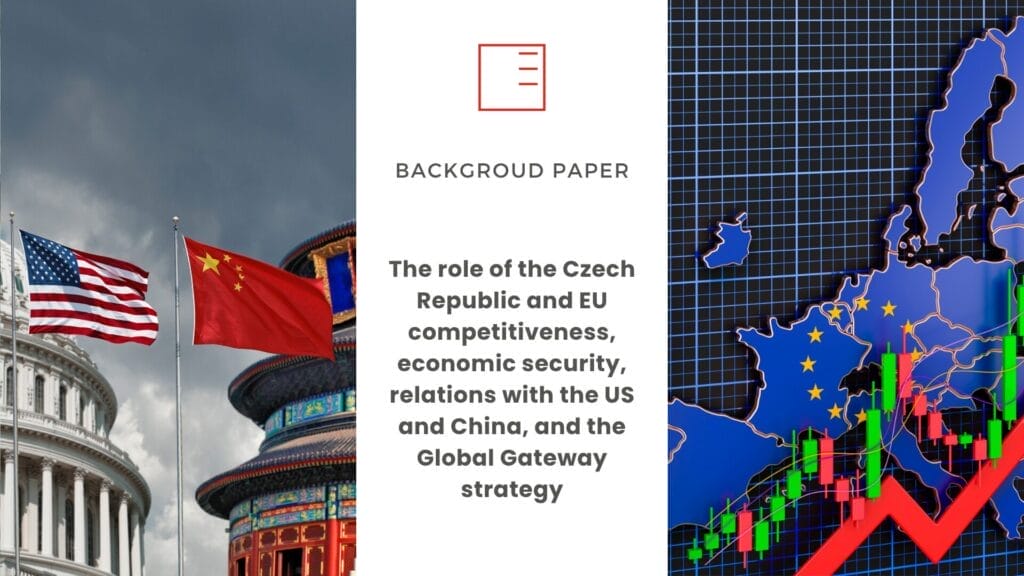
The role of the Czech Republic and EU competitiveness, economic security, relations with the US and China, and the Global Gateway strategy | Background paper of the National Convention on European Union
More info 21. 10. 2025
21. 10. 2025
Economic security and competitiveness are becoming key issues for the European Union in order to maintain its global position and internal stability. The EU faces a long-term lag behind the United States in innovation and technology, while pressure from China and other economic rivals is growing. A new wave of American protectionism, geopolitical upheavals caused by Russian aggression, and the experience of the COVID-19 pandemic have exposed the vulnerability of the European economy and its dependence on external supply chains. The European Commission has therefore presented a set of initiatives – from the Competitiveness Compass to the Clean Industry Agreement – aimed at strengthening resilience, reducing dependence on third countries, and streamlining the business environment. The Global Gateway initiative, which aims to diversify European trade and supply relations through strategic investments and partnerships, is also an important tool for strengthening the Union's global role. Given the strong industrial orientation and openness of the Czech economy, it is essential for Czechia to actively engage in these debates and formulate its priorities within the European economic security strategy.

STVR | Turning point in German politics: the AfD labelled a threat to constitutional order
More info 2. 5. 2025
2. 5. 2025
The German Federal Office for the Protection of the Constitution has designated the political party Alternative for Germany (AfD) as a right-wing extremist entity. The office says it has direct evidence that the activities of the anti-immigration party pose a threat to the democratic order in the country. In addition, the investigation has revealed repeated racist statements by party leaders. EUROPEUM analyst Tereza Novotná commented on the situation for Slovak Radio.
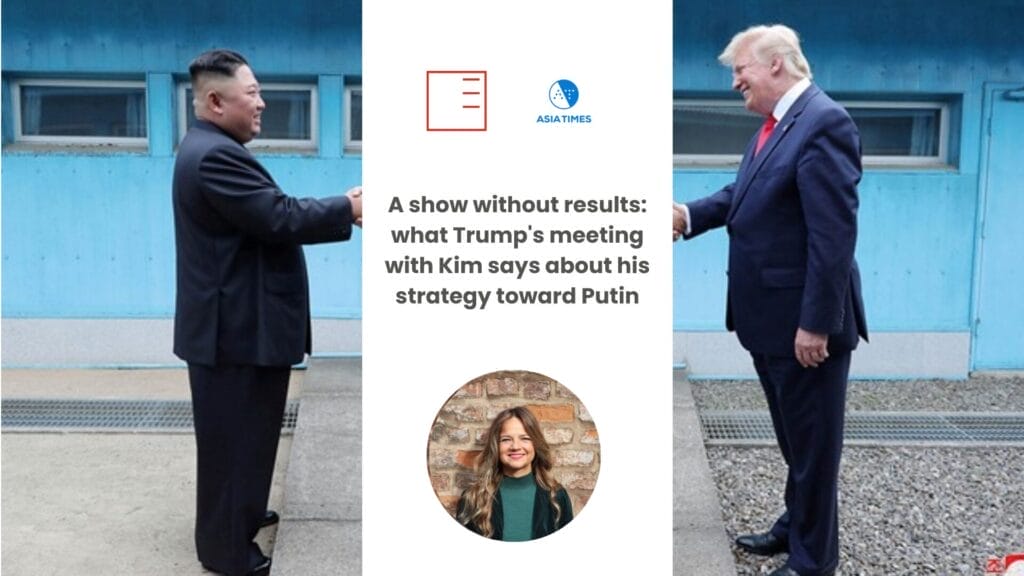
Asia Times | A show without results: what Trump's meeting with Kim says about his strategy toward Putin
More info 26. 4. 2025
26. 4. 2025
Donald Trump repeatedly says he wants to end the war in Ukraine. But the question remains what kind of peace he has in mind - and for whose benefit such a solution would actually be. If we want to understand his current position on Ukraine and Russia, it is worth recalling one of his most significant diplomatic initiatives of the past: an unexpected and controversial meeting with the leader of North Korea during his first term. This episode may suggest much about Trump's negotiating style and what we can expect next. EUROPEUM Institute analyst Tereza Novotna discusses this topic for Asia Times.

CHOICE | The price for Trump's trade policy may be the loss of strategic allies
More info 17. 4. 2025
17. 4. 2025
The Trump administration's unexpected introduction of “liberation tariffs” has shaken global trade. The United States has increased the basic tariff on all imports and introduced new targeted levies that have hit not only China but also allies such as the EU, Japan and South Korea. Although Washington has declared a 90-day pause (outside of China), confidence in the US as a reliable partner may already be eroded. EUROPEUM Institute analyst Tereza Novotná commented on the situation for CHOICE.

CNN Prima News | The conviction of Le Pen as an "atomic bomb": French courts are not afraid of politicians, experts say
More info 4. 4. 2025
4. 4. 2025
For the French, the conviction of far-right leader Marine Le Pen was surprising, and no one expected such severity. That’s how the verdict against the politician, who was a frontrunner in the next presidential election, was described to CNN Prima NEWS by former Czech ambassador to France, Petr Janyška. Together with Tereza Novotná, an analyst from the EUROPEUM think tank, they agreed that the French judiciary is not afraid of politicians at all. This is also demonstrated by the trials of former prime ministers and even presidents of France.

ČRo Plus | AfD on the rise: Election shows divided Germany and unresolved problems
More info 24. 2. 2025
24. 2. 2025
The elections in Germany have once again stirred up the political scene. So far, it looks like a coalition of Christian Democrats and Social Democrats. However, the winner of the elections is said to be the AfD (Alternative for Germany), which, although it came second, has doubled its result since the last elections. What is behind its success and what does it mean for Germany? Tereza Novotná, a political scientist from the EUROPEUM Institute, comments for Czech Radio Plus.
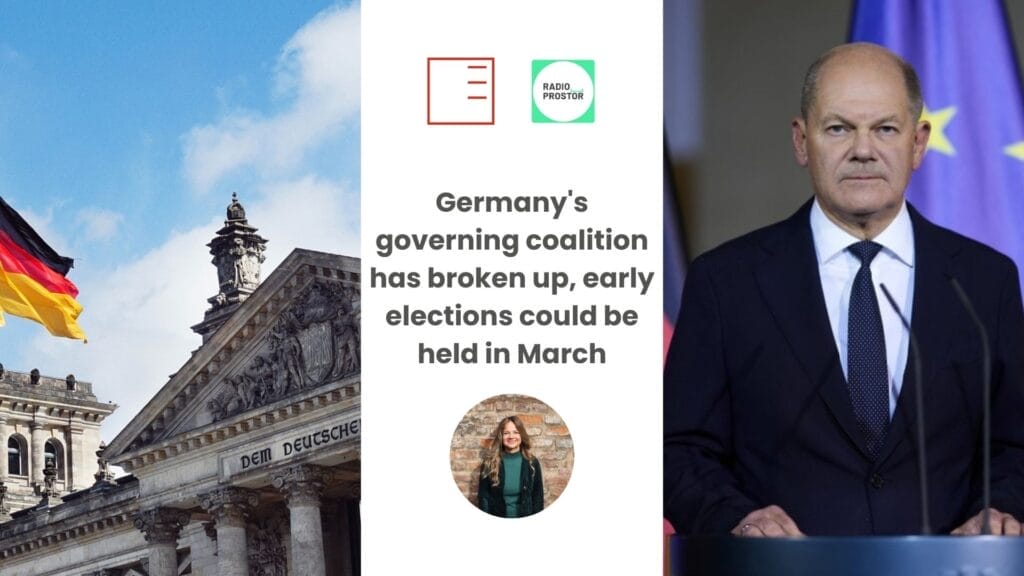
Radio Prostor | Germany's governing coalition has broken up, early elections could be in March
More info 7. 1. 2025
7. 1. 2025
In recent days, Germany's ruling trio coalition has been trying to find a way out of the crisis caused by disagreements over the way forward in the economic recovery. It finally broke up with the departure of the Free Democratic Party. How will the attack on the markets in Magdeburg affect the elections? Tereza Novotná, Associate Research Fellow at EUROPEUM Institute, commented for Radio Prostor.
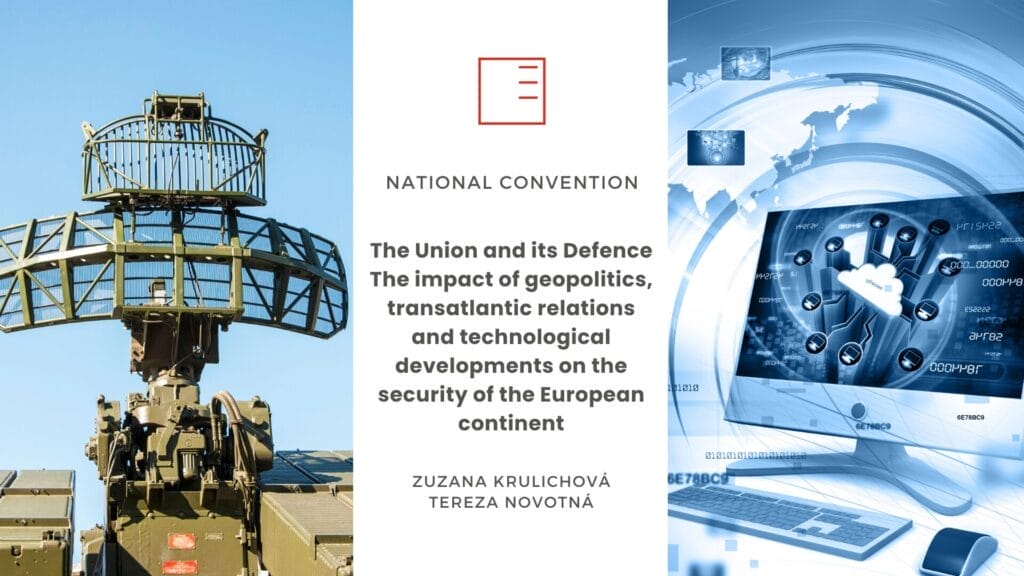
National Convent | The Union and its Defence The impact of geopolitics, transatlantic relations and technological developments on the security of the European continent
More info 17. 12. 2024
17. 12. 2024
The European security environment has changed fundamentally over the past decade in response to growing geopolitical risks. Russia's invasion of Ukraine, the growing influence of authoritarian powers such as China and Russia, and escalating tensions in key regions such as the Middle East and the Indo-Pacific are reshaping the way Europe views its security and defence. These challenges are leading to a deepening of defence cooperation within and outside the EU, which includes the development of new policies, structures and initiatives, and cooperation with NATO also underlines the need for strategic alignment between European and transatlantic partners. Written by EUROPEUM Institute researcher Zuzana Krulichová and research associate fellow Tereza Novotná.
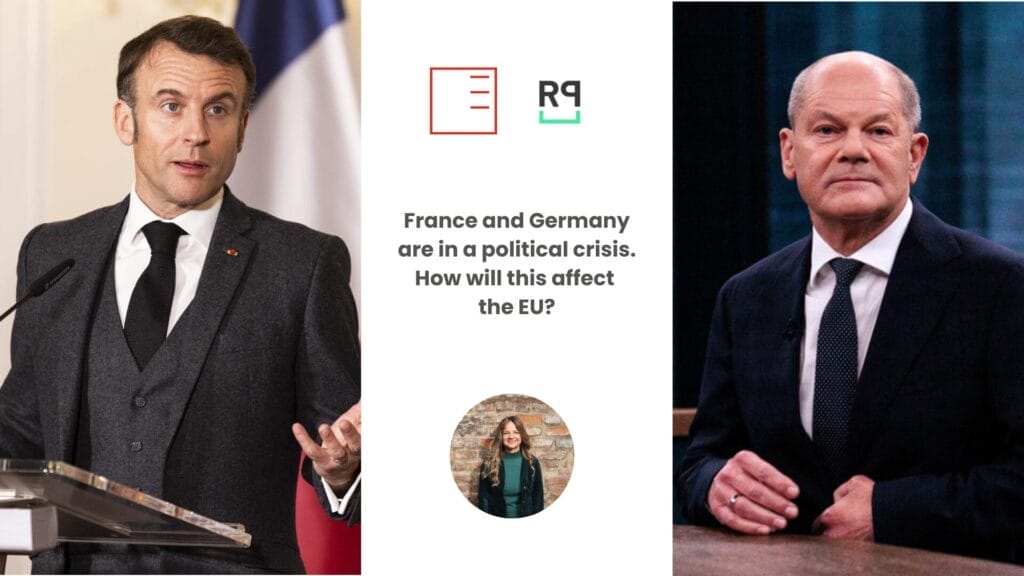
Radio Prostor | France and Germany are in a political crisis. How will this affect the EU?
More info 5. 12. 2024
5. 12. 2024
The government has fallen in France, early elections are coming in Germany. Europe's two strongest economies are in political crisis. Tereza Novotná, Associate Research Fellow at EUROPEUM Institute, commented for Radio Prostor.
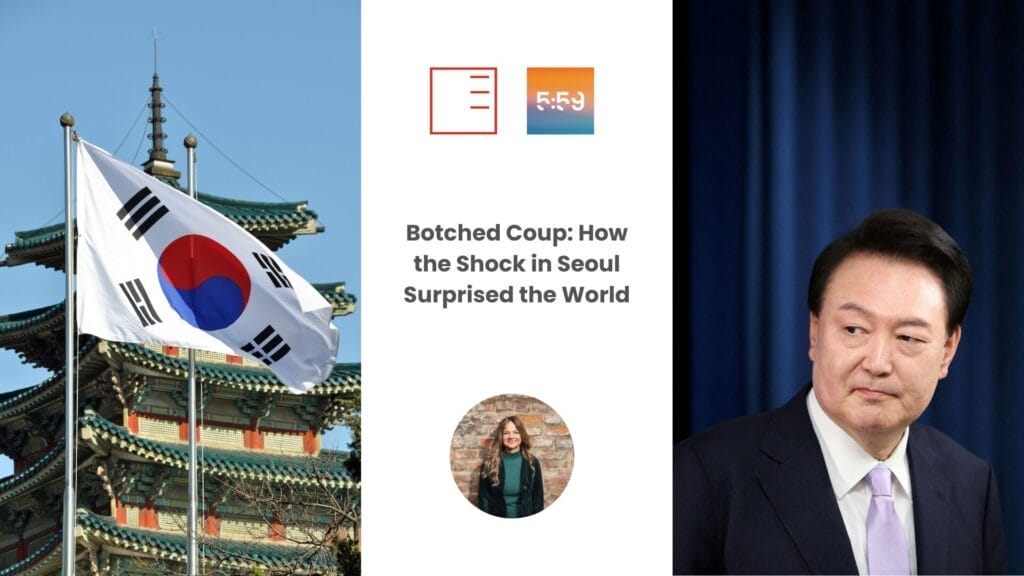
5:59 | Botched coup: How the shock in Seoul surprised the world
More info 5. 12. 2024
5. 12. 2024
In South Korea, President Jun Sok-yol declared martial law on Tuesday, citing alleged sympathies of the opposition with North Korea. The attempted coup failed, but the shock in Seoul remains. Why did these events unfold? And what consequences will the failed coup have? Tereza Novotná, an Associate Research Fellow at EUROPEUM Institute, commented the events on 5:59 podcast of Seznam Zprávy.
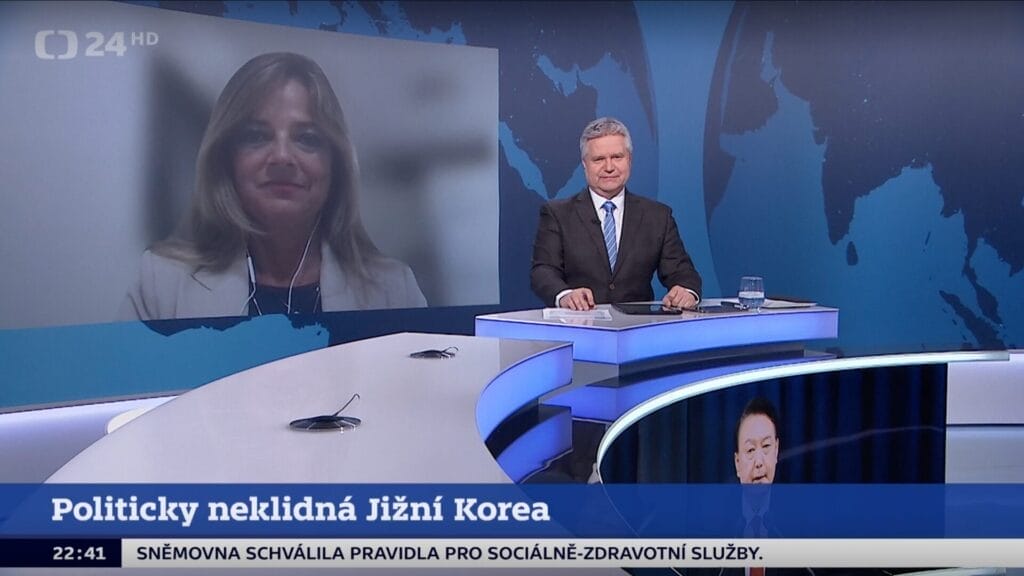
ČT24 | South Korean president surprises the country with martial law
More info 4. 12. 2024
4. 12. 2024
President Yoon Suk-yeol has declared martial law in South Korea. Is this a purely domestic political issue? What does this mean for the country in the future? Tereza Novotná, an Associate Research Fellow at EUROPEUM Institute, commented for ČT24.

iRozhlas.cz | 'We look at him as a fool with power.' Protests could speed up South Korean president's impeachment
More info 4. 12. 2024
4. 12. 2024
Martial law, which was declared by South Korean President Yoon Suk-yeol on Tuesday night, lasted six hours. South Koreans have been in the streets ever since, demanding the President's resignation or impeachment. EUROPEUM Institute Associate Research Fellow Tereza Novotná commented on the situation for iRozhlas.cz.